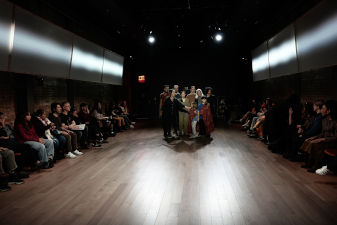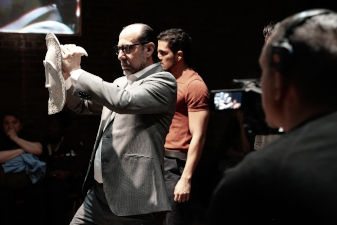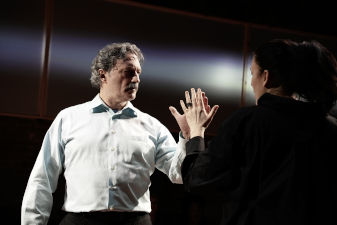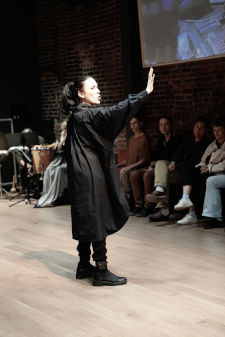
|
Beate Hein Bennett Friendless in a Foreign Land “MEDEA”
This production of the classical “Medea” by Euripides, as re-worked by Andrei Serban and composed by Elizabeth Swados for their 1972 production at La Mama, recasts both texts to incorporate our times of great migrations and exile. The Great Jones Repertory Company, under the direction of Zishan Ugurlu, evokes the ancient text in ritualized form, using ancient Greek and Latin (retained from the Serban/Swados text) to emphasize both the ancient roots of the play but also the reality of the alien migrant who seeks asylum in a foreign land. The present production blends, or rather juxtaposes the myth as Euripides had dramatized it for his Athenian audience in 431 B.C. with the present migrant situation by including vivid testimonies from asylum seekers at various U.S. borders.
The production is interactive in that the audience becomes literally a part of a migrant group. We are shuttled from place to place to finally end up in the space where the play ritual is enacted. We sit around the edge intermingled with the members of the Chorus. In the classical play the Chorus functions as surrogates for the citizens as they comment on the proceedings in the tragedy, sometimes sympathetically, sometimes critical of the actions of the characters. In this production, the audience, like foreign migrants, is left mostly clueless as to what is being said. However, the emotional verbal and physical expressions of the performers embody and project the characters intentions. Over the past century the modern theater has developed a strong tradition of theater as ritual. In our more recent theater history, practitioners like Peter Brook, Andrei Serban, Jerzy Grotowski, and Richard Schechner have experimented with this form. Zishan Ugurlu has created a new blend: she pays homage to Euripides and his tragic female characters, as well as to Andrei Serban and Elizabeth Swados, and she focuses her empathic attention on the tragedy experienced by migrants, especially by women and children.
In keeping with our technologized landscape of social interaction and global awareness, the production makes liberal use of video imagery designed by CultureHub. Compared with some theatrical uses of video technology, in this production video does not interfere with or overpower the live action. Superb lighting design by Joe Levasseur and live music by Music Director Bill Ruyle (on percussion), Heather Paauwe (violin), and Nick Swenson (cello) support the entire ensemble of twenty-three that is to be commended for the precise and powerful performance of a complex spatial choreography and articulation of text. The use of ancient Greek and Latin, languages that are rich in vowels and sibilants and thus physically highly expressive in transmitting strong emotions, is brilliant for this ritualized work.
Euripides created a significant supporting character, The Nurse, who appears first, here played by Valois Marie Mickens, a founding member of the Great Jones Company. Mia Yoo is magnificent as Medea—she embodies the entire range of Medea as the mythical tragic figure. Her physical and vocal prowess project the magic attraction of the ancient Medea. The confrontations with her husband Jason (George Drance), who betrays her by a marriage of convenience with the Creusa (Mattie Barber-Bockelman), Creon’s daughter, her inveigling attempt with King Creon (Arthur Adair) for mercy but who exiles Medea fearing her powers of magic, all these confrontations do not prevent her from being stripped of her place in the land where she and Jason had sought refuge. She plays it all with the full register of emotional agony while avoiding actual physical contact. Medea only touches her two children. We know how the story ends but in true classical tradition, no murder happens onstage—we only hear her primal scream from outside/off-stage. Ms. Ugurlu and the Great Jones Repertory Company have conceived a beautiful work of theater that connects us to the long tragic human history of collective displacement and betrayal by connecting one of the oldest works of theater with the immediate traumas of our own time. One could only hope that it stays in the repertoire of La Mama ETC to be revived after this too short run. |
| recordings | coupons | publications | classified |




